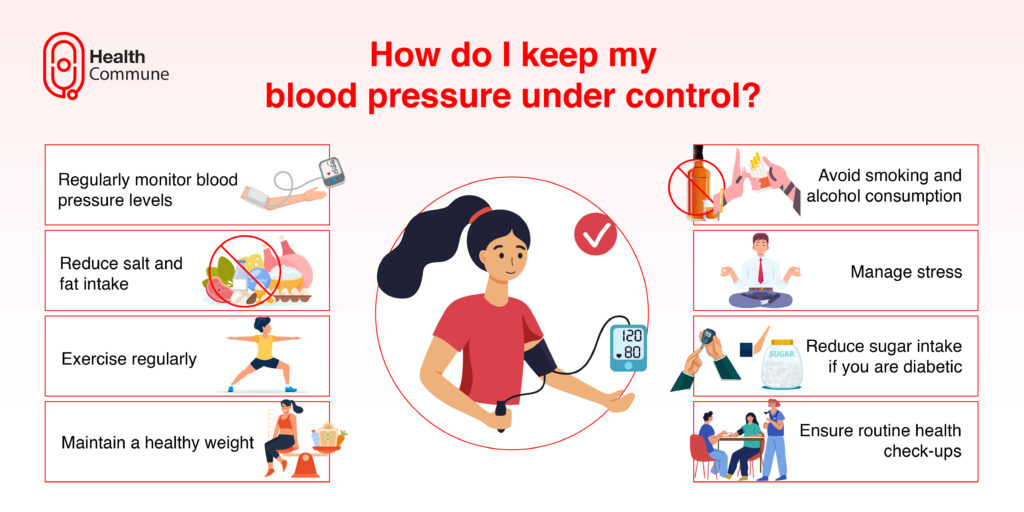What is blood pressure?
What do the numbers in blood pressure mean?
The two numbers in blood pressure denote its two components. The top number is called systolic blood pressure, while the bottom number is called diastolic blood pressure.
- Systolic : This is the pressure or force that the heart exerts on the artery walls as it pumps out blood to the rest of the body (contraction)
- Diastolic: This is the pressure or force that the heart exerts on the artery walls as it relaxes between its contractions
What is hypertension?
Hypertension is a condition when your blood pressure is higher than normal. This means that the force exerted by blood as it flows through your blood vessels is too high. It can lead to many health complications, like heart disease, and stroke
What is normal blood pressure? How is hypertension classified?
According to the American Heart Association (AHA) :
| Category | Systolic BP (mm Hg) | and/or | Diastolic BP (mm Hg) |
|---|---|---|---|
| Normal | <120 | and | <80 |
| Elevated | 120-129 | and | <80 |
| High Blood Pressure (Hypertension) Stage 1 | 130-139 | or | 80-89 |
| High Blood Pressure (Hypertension) Stage 2 | ≥140 | or | ≥90 |
| Hypertensive crisis | >180 | and/or | >120 |
Are there different types of hypertension?
Based on the underlying cause, it can be of two types :
- Primary/essential: This is when there is no detectable cause behind the high blood pressure
- Secondary: There is some underlying health issue causing the high blood pressure, such as kidney disease, tumours of the adrenal glands, medications

What are the risk factors of hypertension?
Factors that increase your risk of high blood pressure are:
- Increased age
- Positive family history
- Tobacco smoking
- Alcohol consumption
- Lack of physical activity or sedentary lifestyle
Stress - A diet rich in salt and deficient in potassium
- Obesity
- Chronic conditions such as diabetes, kidney disorders, thyroid problems, and sleep apnoea
What are the symptoms of hypertension?
Hypertension is largely a silent disease. Even extremely high blood pressure usually doesn’t cause symptoms for most people and is only detected during a checkup.
Symptoms of a hypertensive emergency (critically high blood pressure levels that can lead to organ damage) include :
- Severe headache
- Blurring of vision
- Chest pain
- Dizziness or fatigue
- Difficulty in breathing
- Blood in the urine
How is hypertension diagnosed?
The most common method for diagnosis is by checking your blood pressure using a blood pressure cuff (sphygmomanometer). Just a single high reading doesn’t necessarily mean you have hypertension. Doctors usually take two separate readings on different days before giving a positive diagnosis.
Ambulatory blood pressure measurements, which is measure blood pressure over a continuous period of 24 hours, can also be recommended for a more accurate diagnosis.
In case your doctor suspects some other underlying cause, they may prescribe additional investigations such as testing the urine for blood, glucose, or protein, kidney function tests, blood glucose and cholesterol levels, thyroid function testing, or ECG.
How can blood pressure be kept under control?
Strategies include :
- Regular monitoring of blood pressure levels
- Reduce salt and fat intake
- Exercise regularly
- Maintain a healthy weight
- Avoid smoking and alcohol consumption
- Manage stress
- If diabetic, reduce sugar intake
- Have routine check-ups to detect complications
What are the complications of hypertension?
Common complications include :
- Heart attack
- Heart failure
- Stroke
- Aneurysms
- Vision problems
- Kidney failure
- Hypertensive encephalopathy, which can manifest as confusion, headache, and fits
How is hypertension managed?
It can be managed through a combination of lifestyle modifications and medications.
- Lifestyle modifications: These include :
1. Exercising regularly
2. Maintaining a healthy weight
3. Avoiding smoking and chewing tobacco
4. Drinking alcohol in moderation
5. Following the ‘DASH’ diet
6. Reducing stress by meditating, doing breathing exercises, and yoga - Medications: If your blood pressure is not under control despite the above lifestyle modifications, your doctor can prescribe you :
1. Diuretics: These reduce the amount of water and sodium in your body and reduce the amount of fluid flowing through your blood vessels
2. ACE inhibitors: These drugs restrict the action of ACE (angiotensin-converting enzyme), which is responsible for the production of a substance called angiotensin II. This decreases blood volume and relaxes the blood vessels
3. ARBs (Angiotensin receptor blockers): ARBs exhibit the same effect as ACE inhibitors by preventing the binding of angiotensin II to its receptor
4. Beta blockers: These block the beta receptors and cause the heart to beat more slowly, thereby reducing the blood pressure
5. Calcium channel blockers: They prevent the entry of calcium into the heart and blood vessels, which causes the heart to beat more slowly and reduces the blood pressure
Additionally, you can also be prescribed vasodilators, combined alpha and beta blockers, blood cholesterol-lowering drugs (statins), and aspirin
What is a DASH diet?
The DASH diet, or ‘Dietary Approaches to Stop Hypertension’, is a diet specially designed to prevent or treat high blood pressure. According to this diet :
- Include lots of vegetables, whole grains, and fruits
- Avoid sweets and sugar-sweetened beverages
- Include fish, poultry, beans, vegetable oils, nuts, and fat-free or low-fat dairy products
- Avoid saturated fats and opt for leaner meats instead
- Select foods with a lower sodium content (limit your daily sodium intake to 5 grams per day)




